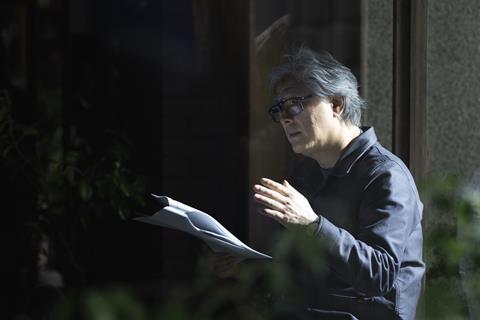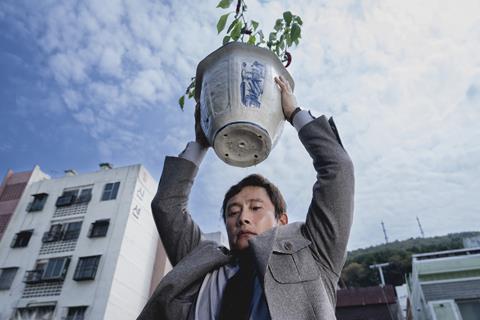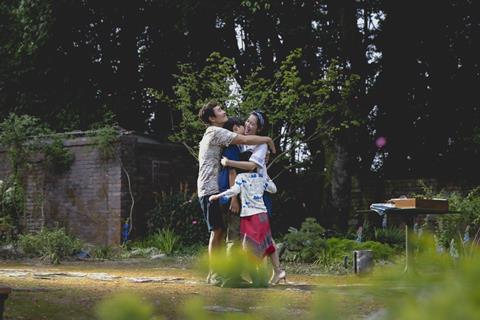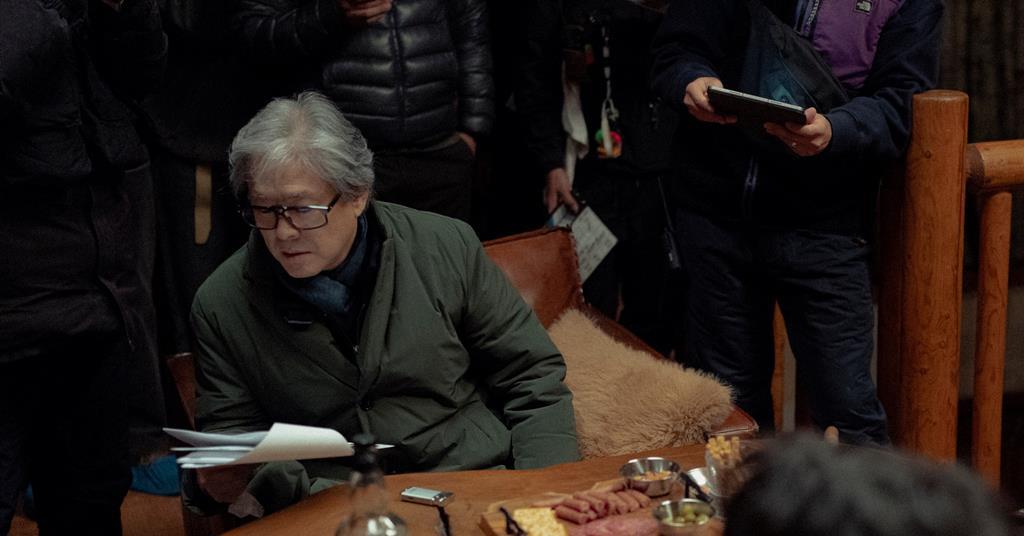Three years after winning best director at Cannes with Decision To Leave, Korean auteur Park Chan-wook is back with No Other Choice, the project he says he “most wanted to make” for the past 20 years.
The film made its world premiere in Venice competition in August, its North American premiere in Toronto earlier this month – where it claimed the inaugural International People’s Choice Award – and will open the 30th Busan International Film Festival tonight (September 17).
The critically lauded film is an adaptation of US writer Donald E. Westlake’s 1997 novel The Ax, in which a middle-aged manager at a paper company gets downsized, and, failing to get hired to a shrinking pool of jobs for which he is specially qualified, resorts to seeking out and eliminating his rivals.
“I’ve always liked mystery novels and have read this-and-that since my adolescence, but there was never one I wanted so particularly to make into a film,” Park tells Screen.
“The mystery genre often has more of the whodunnit variety where once the puzzle is solved, everything else is resolved and it’s not so interesting to savour again after you’ve read it once. But this work starts off as a story about a man who is about to commit a crime and we follow him, so there’s no puzzle in that sense.
“It’s about his psychology and the process by which an ordinary person who was perfectly normal, ends up like this in a social system. No matter how many times I chewed it over, it was interesting and worth savouring, and the various psychological devices were well-crafted. The victims he’s trying to deal with are all like his alter egos.”
The director also tapped into something in the novel he saw he could uniquely expand upon. “What I considered most important was that the story is a deeply bitter tragedy, but I saw the potential for adding a new kind of absurd humour. The novel itself has some of that quality, but I thought, ‘Ah, if I were to make this, I could bring to life a humour that’s even sadder in its funniness,’” says Park.
In the process of tracking down the rights, he discovered that filmmaker Costa-Gavras had made a French adaptation of Westlake’s novel under the international title The Axe in 2005, produced by his wife Michèle Ray Gavras.. “Its tone was very different from what I wanted to make, fortunately, so I thought I could make a new film,” says Park. “Strictly speaking, this isn’t a remake of Costa-Gavras’ The Axe, but the second adaptation of Westlake’s The Ax.”
Park has to shuffle through a list of films he has presented at Cannes over the years to figure out when he met with Costa-Gavras on the Croisette. He attended in 2004 with Oldboy, which won the Grand Prix, then again in 2009 with Thirst, which won the special jury prize, and with The Handmaiden in 2016, which was in Competition, all before going with Decision To Leave. In terms of timing, he figures it must have been when he was there with Thirst.
“They were very attached to their film and were originally not going to give permission for a second. But they said, ‘Since it’s you, we’ll give it,’” Park recalls. “Costa-Gavras was originally going to be credited as well but Michèle, the wife, was mainly doing the work so she became a producer and then after years of it, Alexandre, the son, came on board, too.”
They are both credited with Park and Back Jisun (Decision To Leave) as producers on No Other Choice.
Development

Park started adapting a first draft with writer-director Lee Kyoung-mi, and had it translated from Korean to English so that Don McKellar, whom Michèle had found, could rewrite it with him. Developing it as an English-language film set in the US, he went location scouting with Michèle and director of photography Kim Woo-hyung (Little Drummer Girl), with whom he also worked on storyboards, and the project moved forward bit by bit. “When I was working on another film, the project would stop, but then it would start up again, and so for a long period of time, the spark stayed alive,” says Park.
In the meantime, he and McKellar also worked together as writers and showrunners on HBO miniseries The Sympathizer. Their work made headlines long after the show aired in 2024 as the Writers Guild of America (WGA) last month controversially expelled them on grounds of strikebreaking in 2023. The two maintain they did not go against any strike rules, working as executive producers editing in post-production.
Park stated he considered appealing the expulsion but decided to focus on post-production for No Other Choice. “There aren’t any special restrictions on us,” he says, referring to the understanding that WGA’s expulsion does not mean they can be banned under US federal law from writing on any further projects, although it does mean they cannot vote or be eligible for anything in the guild.
With No Other Choice, Park eventually came to the realisation that it would be difficult to get the amount of investment needed for the film he envisioned without any compromises in the US. So he rewrote the script with Jahye Lee as a Korean film and quickly got investment from CJ ENM, which has a long history of backing his work including The Handmaiden and Decision To Leave.
A family story

Park cast Lee Byung-hun as the hapless murdering protagonist Man-su. The Squid Game star had previously worked with the auteur early in his career on the seminal Demilitarized Zone mystery thriller Joint Security Area (2000) and on the short film Cut, which Park directed as part of the 2004 horror anthology Three…Extremes. Son Yejin (Crash Landing On You) plays his resourceful wife. The stellar supporting cast of characters that Man-su comes across includes Park Hee Soon (My Name), Lee Sung Min (12.12: The Day), Yeom Hye Ran (When Life Gives You Tangerines) and Cha Seung Won (Uprising).
“It’s about the struggles of an unemployed person trying to get back into the workforce, but compared to the original and to Costa-Gavras’ film, I wanted as much as possible to go in the direction of making it a family story. That’s why we absolutely needed a prominent actress like Yejin,” says Park, adding they gave more weight to her role “from script adaptation through to editing”.
He reflects he touched upon family issues in previous films such as Thirst, Sympathy For Mr. Vengeance and Stoker, but that this is his first Korean film where he fully addresses family issues with a focus on a single household – one “that even has children and dogs”.
Ultimately, Park says his focus was on making it “a family story that asks, ‘How does this man perceive the responsibility he has placed on himself as the head of the family who protects the family?’ It’s a further exploration of the narrow box of masculinity that men define for themselves in modern society, in patriarchal society.”
Shooting
“Production started at the height of summer and ended in winter,” recalls Park. The film had 85 shooting days during the period of August 17, 2024 to January 15, 2025.
He explains that Man-su’s house – the threatened foreclosure of which is one of the last straws for the man – is like another character. Production designer Ryu Seong-hie (The Handmaiden) and Park took special care renovating the look of a house they found in Asan, all the way down to bonsai trees and flowers they added in the yard. Interiors were shot on sets at CJ’s studios in Paju. Other locations were around the country including in Inje, Yangpyeong and Busan.
Compared to the early days of his career, Park says: “Now that I have many actors and heads of departments I’m close with, the set is more comfortable than tense. Of course, a certain amount of tension is necessary, so it’s always beneficial to have a good mix of new and familiar actors, but it’s fundamentally comfortable.
“Since the DoP, production designer, costume designer, lighting, hair and makeup heads are all people I’m close with, it feels more and more like going to work at a company. It’s not that artistic tension has diminished, but rather, in a relaxed state, I feel more able to focus on creative thinking. There’s no needless interpersonal tension, no emotional drain.”
Thus, the shoot for this latest film went smoothly without incident – except for one night.
“We were shooting in Inje when martial law was declared,” says Park, remembering the night of December 3, 2024 when South Korea’s subsequently-unseated, then-president Yoon Suk Yeol shocked the world by declaring martial law at 10:29PM local time.
“We were in the middle of a night shoot and I had to wonder if I’d be able to go home because I live in Paju, near the Demilitarized Zone.”
The National Assembly voted it down in less than three hours, but not without drama as citizens rushed to the defence of the lawmakers as they made it in and voted while armed military and police on orders from the president surrounded and breached the building. Yoon delayed rescinding martial law until the early hours of December 4.
“We were shooting a scene where Lee Byung-hun was getting Park Hee Soon drunk,” he says of the shoot that ended around sunrise. “It was cold and so we were all worried about how to prepare against the cold. But then that preposterous news came in and we were momentarily phased. Still, all being professionals, we got a grip and completed the day’s designated pages. Thinking about it now, [everyone] was exceptional.”
Post-production

Although many anticipated Park returning to Cannes with No Other Choice in May, he says it would have been impossible to finish post-production: “We barely made it in time for Venice,” he says. “If I had my way, I would like to do a few more months, but they say the Chuseok season is important.”
The autumn harvest moon festival, which falls October 5-9 this year, is seen as a peak box office season in South Korea.
Post-production included recording the film’s score by music director Cho Young-wuk (Decision To Leave) at the legendary Abbey Road Studios in the UK with internationally acclaimed cellist Jean-Guihen Queyras and the London Contemporary Orchestra.
“The soundtrack ranges from Mozart to popular Korean trot music with a large number of songs that are played as listened to by the characters,” says Park. “The score is a little closer to modern music, the most modern of what I’ve done, so we squeezed out the production budget to be able to record [with them there]. I’ve recorded at a lot of places, but this was the best sound quality and the best performers’ skills I’ve ever seen.”
CJ has stated that the film already recouped its production costs of $12.3m (KW17bn) with pre-sales to more than 200 territories, including North America where Neon – which shepherded Bong Joon Ho’s Parasite through its successful Oscar run – reps the film. No Other Choice has been selected as South Korea’s submission to the 2026 Oscars best international feature category and is set to receive its US premiere at the New York Film Festival in October.
As for his film opening Busan’s landmark 30th edition, Park says: “I’m happy as the Busan film festival has been with the renaissance of Korean cinema throughout its 30 years.”
Although it did not pick up any awards in Venice, the laudatory buzz there at the start of its trajectory helped No Other Choice shoot to the top of the pre-ticketing chart 17 days before its September 24 local release – sooner than other films that eventually went over the landmark 10 million admissions score such as last year’s top box office hit Exhuma (four days before release) and 2023’s top performer 12.12: The Day (10 days before).
As for what comes next, Park says he considered several projects but emphasises nothing is confirmed. These include “an old Western script, Brigands Of Rattlecreek, which we don’t know when will get made,” and he is “also considering Genocidal Organ, based on a Japanese novel”.
Having worked on English-language projects such as Stoker, The Sympathizer and Little Drummer Girl with translators, Park says he has found filmmaking people are all similar and, when on the same page, can understand one another even when using different languages.
He has discovered a creative facet to working through translation. “Because I have to write dialogue in another language, strictly speaking, I’m not writing the lines myself,” he explains. “I write them in Korean, and when they are translated, I look at them and ask, “Is this the best way to say this in translation?” and refine them that way.
“It takes a lot of patience, but I find it interesting to find the best expression within the limitations of the little English skills I have. So, when I’m talking to a translator who’s fluent in English, sometimes I come up with unexpectedly plausible ideas. And even when I don’t, I realise, ‘Oh, so that’s why English expressions are different,’ and I search for ones that only exist in English, creating new and different nuances than when I wrote in Korean. That’s another creative process. And that’s fun, too.”


